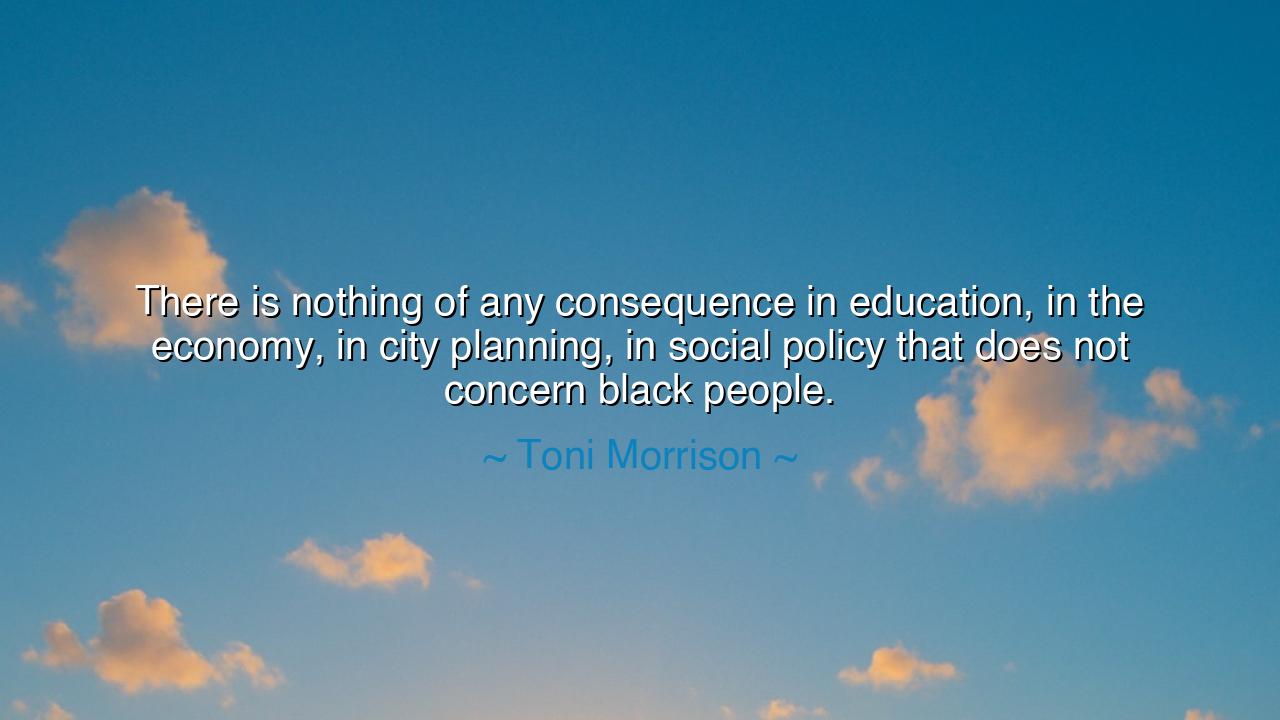
There is nothing of any consequence in education, in the economy
There is nothing of any consequence in education, in the economy, in city planning, in social policy that does not concern black people.






Hear now the voice of Toni Morrison, the great seer of America’s conscience, who clothed truth in words that could not be ignored. She declared: “There is nothing of any consequence in education, in the economy, in city planning, in social policy that does not concern Black people.” These words are both lament and proclamation, a reminder that the story of America cannot be told without its Black citizens, and that every law, every school, every street, every dollar spent bears upon their lives. For Morrison speaks not of separation, but of inseparability: the destiny of a nation is bound up with the fate of its most marginalized.
For what is education without the children of Black America, who for generations were denied its light, yet fought for its flame? From segregated classrooms to underfunded schools, their presence has revealed the nation’s failures and tested its promises. To ignore them in the shaping of education is to repeat the injustices of history. Morrison’s words demand recognition: the schools that prepare a nation must prepare all, or they prepare none.
And what is the economy without the labor of Black hands? From the fields of slavery to the factories of the North, from the railroads to the offices of modern cities, Black people have built, produced, and sustained the wealth of a nation that often denied them a share in it. To speak of the economy as if it were neutral or colorless is blindness. Every policy of wages, housing, loans, and labor touches Black lives as deeply as any other—indeed, often more deeply, for they have borne the brunt of exclusion and exploitation.
Consider city planning: where highways were laid through Black neighborhoods, where red lines drew invisible prisons, where homes were demolished and communities scattered. The design of cities is never mere architecture; it is the shaping of human life. And Morrison reminds us: these decisions, though they claim to be about roads and buildings, always concern Black people, whose communities have so often paid the highest cost of progress defined by others.
Nor can social policy be divorced from race. Welfare, healthcare, policing, criminal justice—every law that governs society has fallen upon Black citizens, sometimes as protection, often as burden. The Civil Rights Act and Voting Rights Act were not abstract victories; they were lifelines. Morrison’s voice insists that no policy can be judged fair or wise until it is seen through the lens of those who have been most marginalized by the system.
History provides its witness. In 1954, the case of Brown v. Board of Education revealed that the entire nation’s claim to justice hinged on whether Black children could learn in equal schools. The decision was not only about Black students—it was about the soul of America. The Montgomery Bus Boycott, sparked by Rosa Parks, was not only about buses—it was about the dignity of every American. Time and again, the struggles of Black people have exposed the weaknesses of the nation’s promises and forced them to be made real.
Thus, Morrison’s words are both reminder and commandment. They remind us that no decision of importance in society can exclude the voices of the Black community without being a lie. They command us to see that justice for some is fragile, but justice for all is enduring. To imagine education, economy, cities, or policies without centering those who have borne the greatest burdens is to build upon sand, not stone.
Therefore, O listener, take this lesson into your life: when you think of schools, think of every child; when you speak of policy, speak of every citizen; when you plan for the future, plan for all. Ask always: how will this affect the most marginalized? What burden will this place upon them, and what freedom will it give? For as Toni Morrison declared, nothing of consequence in a society can be separated from its Black people—because they are not at the margins of the story, but at its heart. And if the heart is ignored, the body cannot live.






AAdministratorAdministrator
Welcome, honored guests. Please leave a comment, we will respond soon